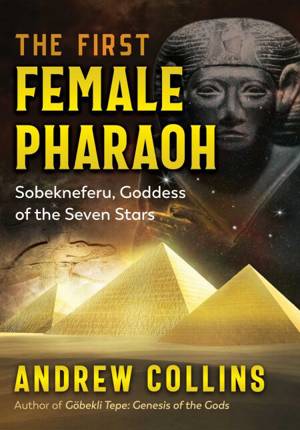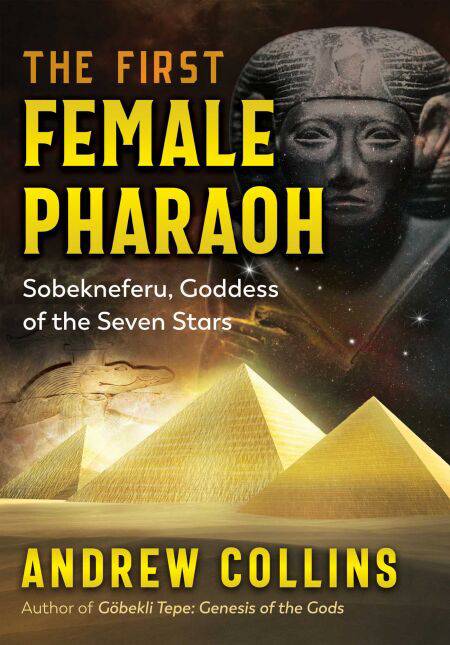
Je cadeautjes zeker op tijd in huis hebben voor de feestdagen? Kom langs in onze winkels en vind het perfecte geschenk!
- Afhalen na 1 uur in een winkel met voorraad
- Gratis thuislevering in België vanaf € 30
- Ruim aanbod met 7 miljoen producten
Je cadeautjes zeker op tijd in huis hebben voor de feestdagen? Kom langs in onze winkels en vind het perfecte geschenk!
- Afhalen na 1 uur in een winkel met voorraad
- Gratis thuislevering in België vanaf € 30
- Ruim aanbod met 7 miljoen producten
Zoeken
The First Female Pharaoh E-BOOK
Sobekneferu, Goddess of the Seven Stars
Andrew Collins
E-book | Engels
€ 20,12
+ 20 punten
Uitvoering
Omschrijving
The cult, magic, reign, and resurrection of the first female ruler in Egypt
• Reveals the achievements of Sobekneferu, the political and religious issues of her age, the temples and ruins associated with her, and her continuing impact on ancient Egypt after her reign
• Discusses Sobekneferu’s magical beliefs and practices centered on the crocodile god Sobek, the hippo goddess Neith, and their representation as constellations
• Examines the modern-day resurrection of Sobekneferu among mystics and occultists of Victorian London, including her role in Bram Stoker’s shocking gothic novel, The Jewel of the Seven Stars
Cleopatra. Nefertiti. Hatshepsut. All of them are ancient Egyptian female rulers who rose above their predominantly patriarchal societies to become controllers of a great empire. Missing from this list, however, is Sobekneferu, ancient Egypt’s first female ruler. Why was the reign of this powerful woman all but forgotten?
Piecing together the lost history of the first female pharaoh, Andrew Collins presents the first comprehensive biography of Sobekneferu. Using every text and monument that concerns Sobekneferu and her time in power, he examines her achievements as ruler, the political and religious issues of her age, the temples and ruins associated with her, and her continuing impact on ancient Egypt after her reign. He explores her relationship with her brother Amenemhat IV, her sister Neferuptah, and their father Amenemhat III, regarded as one of the most beloved pharaohs of the Middle Kingdom. He examines Sobekneferu’s untimely end, the fate of her body, and the cult that developed in her name.
Discussing Sobekneferu’s magical beliefs and practices, Collins shows how they centered on the crocodile god Sobek, the hippopotamus goddess Neith, and Sekhmet, the goddess presiding over divine power. He reveals also how Sobekneferu’s suspected pyramid was positioned to align with the setting of Eltanin, the brightest star in the constellation of Draco, seen in ancient Egypt as the celestial form of Sobek. Examining the modern-day resurrection of Sobekneferu among the occultists and mystics of Victorian London, Collins shows how she is the true inspiration behind every ancient Egyptian female queen who comes back to life after her tomb is found—as featured first in Bram Stoker’s shocking 1903 novel The Jewel of Seven Stars and later in several modern blockbuster movies.
Revealing how Sobekneferu has left a lasting impact on culture and occulture through the ages despite being nearly erased from history, Collins shows how her continuing legacy is perhaps, ultimately, her true resurrection.
• Reveals the achievements of Sobekneferu, the political and religious issues of her age, the temples and ruins associated with her, and her continuing impact on ancient Egypt after her reign
• Discusses Sobekneferu’s magical beliefs and practices centered on the crocodile god Sobek, the hippo goddess Neith, and their representation as constellations
• Examines the modern-day resurrection of Sobekneferu among mystics and occultists of Victorian London, including her role in Bram Stoker’s shocking gothic novel, The Jewel of the Seven Stars
Cleopatra. Nefertiti. Hatshepsut. All of them are ancient Egyptian female rulers who rose above their predominantly patriarchal societies to become controllers of a great empire. Missing from this list, however, is Sobekneferu, ancient Egypt’s first female ruler. Why was the reign of this powerful woman all but forgotten?
Piecing together the lost history of the first female pharaoh, Andrew Collins presents the first comprehensive biography of Sobekneferu. Using every text and monument that concerns Sobekneferu and her time in power, he examines her achievements as ruler, the political and religious issues of her age, the temples and ruins associated with her, and her continuing impact on ancient Egypt after her reign. He explores her relationship with her brother Amenemhat IV, her sister Neferuptah, and their father Amenemhat III, regarded as one of the most beloved pharaohs of the Middle Kingdom. He examines Sobekneferu’s untimely end, the fate of her body, and the cult that developed in her name.
Discussing Sobekneferu’s magical beliefs and practices, Collins shows how they centered on the crocodile god Sobek, the hippopotamus goddess Neith, and Sekhmet, the goddess presiding over divine power. He reveals also how Sobekneferu’s suspected pyramid was positioned to align with the setting of Eltanin, the brightest star in the constellation of Draco, seen in ancient Egypt as the celestial form of Sobek. Examining the modern-day resurrection of Sobekneferu among the occultists and mystics of Victorian London, Collins shows how she is the true inspiration behind every ancient Egyptian female queen who comes back to life after her tomb is found—as featured first in Bram Stoker’s shocking 1903 novel The Jewel of Seven Stars and later in several modern blockbuster movies.
Revealing how Sobekneferu has left a lasting impact on culture and occulture through the ages despite being nearly erased from history, Collins shows how her continuing legacy is perhaps, ultimately, her true resurrection.
Specificaties
Betrokkenen
- Auteur(s):
- Uitgeverij:
Inhoud
- Aantal bladzijden:
- 464
- Taal:
- Engels
Eigenschappen
- Productcode (EAN):
- 9781591434467
- Verschijningsdatum:
- 24/04/2023
- Uitvoering:
- E-book
- Beveiligd met:
- Adobe DRM
- Formaat:
- ePub

Alleen bij Standaard Boekhandel
+ 20 punten op je klantenkaart van Standaard Boekhandel
Beoordelingen
We publiceren alleen reviews die voldoen aan de voorwaarden voor reviews. Bekijk onze voorwaarden voor reviews.









